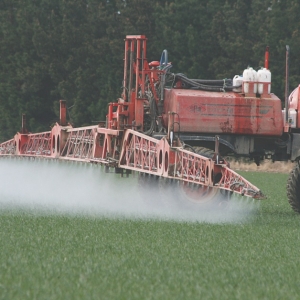“If you use or recommend the use of herbicides you will get herbicide resistance: it’s inevitable,” Syngenta solutions development manager Jason Sabeeney told delegates.
“The good news is that management practices and strategies do have a big bearing on how fast it happens.”
Sabeeney highlighted the dire situation many Australian grain growers face with the annual ryegrass Lolium rigidum which is now resistant to six or seven different mode of action (MOA) herbicides.
“The only ones it’s not resistant to now are the modes of action that were never active on annual ryegrasses!”
It’s forced growers into extreme mechanical measures to control the weed, such as a A$150,000 machine that’s towed behind the header to catch the chaff and grind it so every weed seed is destroyed.
While the situation in New Zealand isn’t nearly as severe, there are already at least 14 weeds which have become resistant to herbicides from one or more of six modes of action. Globally 217 weed species are known to have developed resistance.
“It’s a major threat to the production and sustainability of grain productions systems.”
While farm-level biosecurity is important to avoid importing a problem, most cases of resistance are the result of herbicide practice on the farm where it’s found, Sabeeney stressed.
“This is not something the neighbour gives you.”
Diversity of cropping and controls is the key to reducing the selection pressure on weed populations to develop resistance, and, should any weeds survive a herbicide application, preventing them from setting seed. “That’s the mistake the Australian farmers made.”
A tell-tale sign that a weed is resistant to a herbicide is if it survives when near neighbours, of the same species, are dead. Leave that resistant weed to set seed, and you have a patch of weeds resistant to that particular herbicide mode of action for years to come. “No matter how long you leave the herbicide out, as soon as you go back to using that group of chemistry, [resistance] will come back very quickly.”
Machinery, especially headers, and livestock accelerate the spread of a patch across a paddock, farm or even district.
Despite billions of dollars spent by the likes of Syngenta looking for herbicides with new modes of action, none have been found since the 1980s so a new product to get growers with resistant weed populations ‘out of jail’ isn’t likely, Sabeeney warned.
Typically it’s the best farmers in a district who find resistant weed populations first, because they are the ones to have used herbicides most heavily, hence exerted the highest selection pressure, he added.
“Just because you’ve got herbicide resistance doesn’t mean you’re a bad farmer: it’s how you deal with it that determines whether you’re a good farmer or not.”
Knowing which mode of action or ‘group’ herbicides belong to is essential to rotate the types of herbicide used, not just in one crop, but across all crops grown.
That rotation strategy should dovetail with cultural controls such as high seed rates to suppress weeds, burning and/or ploughing.
Asked about genetically engineered crops, Sabeeney said they could be very useful, if used sensibly, but they hadn’t been in the United States.
“The US now has 25 million ha with glyphosate resistant weeds. That’s the size of the Australian [cereal] crop area. I’m not saying they aren’t good: they were too easy…. Now they’ve got workers hand-pulling weeds to make their systems sustainable.”

















